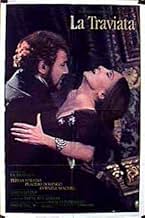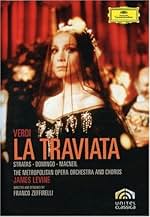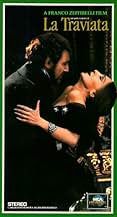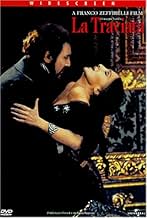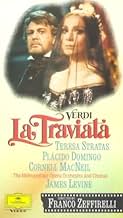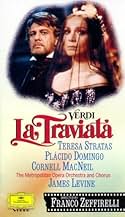AVALIAÇÃO DA IMDb
7,6/10
1,6 mil
SUA AVALIAÇÃO
Retrata o romance entre uma cortesã adoecida e que se encaminha para a morte e um jovem que a amava em segredo e revela seus sentimentos durante uma festa.Retrata o romance entre uma cortesã adoecida e que se encaminha para a morte e um jovem que a amava em segredo e revela seus sentimentos durante uma festa.Retrata o romance entre uma cortesã adoecida e que se encaminha para a morte e um jovem que a amava em segredo e revela seus sentimentos durante uma festa.
- Direção
- Roteiristas
- Artistas
- Indicado a 2 Oscars
- 6 vitórias e 5 indicações no total
Ariel Bybee
- The Voices of
- (canto)
Michael Best
- The Voices of
- (canto)
- Direção
- Roteiristas
- Elenco e equipe completos
- Produção, bilheteria e muito mais no IMDbPro
Avaliações em destaque
10hms66
What glorious music! What Glorious singing! A story bigger than life. Production values that do justice to Verdi's opera. This is grand opera at its grandest. In a scale from 1 to 19, this is a 20.
Generally in opera, the singing is the thing. One puts up with elephantine singers, make believe props, bad acting, and other shortcomings to enjoy the music, and especially, the singing. In this film, none of this annoyances takes place. Teresa Stratas looks beautiful as Violeta should. She sings gloriously as Teresa should. Ditto with Placido Domingo. Unlike some opera singers, both of them can act. The sets are sumptuous, the lighting excellent, the cinematography nonpareil. The direction and editing propel the story without flagging for any moment. This film is as close to perfection as humans can achieve.
Generally in opera, the singing is the thing. One puts up with elephantine singers, make believe props, bad acting, and other shortcomings to enjoy the music, and especially, the singing. In this film, none of this annoyances takes place. Teresa Stratas looks beautiful as Violeta should. She sings gloriously as Teresa should. Ditto with Placido Domingo. Unlike some opera singers, both of them can act. The sets are sumptuous, the lighting excellent, the cinematography nonpareil. The direction and editing propel the story without flagging for any moment. This film is as close to perfection as humans can achieve.
10AtosaR
Beautiful...just beautiful. Sad and emotional. Beautiful story, music, singing and acting. Beautifully done. I'm at a loss for more words here. Not to be missed!
This version of the famous tearjerker La Traviata was just wonderful from beginning to end. The cinematography was stunning, and just as luscious were the costumes and locations, especially the villa outside Paris. The music by Verdi is just superb, no wonder it is one of the most performed operas today, from the prelude of Act 1, Brindisi(which I am sure everybody knows even if they're not into opera), Sempre Libra, Di Provenza to the heart-rending ending and especially the Act 2 duet between Violetta and Germont, it is just delightful, and is bound to bring tears to people's eyes like it did to me. The plot, based on the book by Alexandre Dumas Junior, is not too complicated and easy to follow. The performances are astonishing. Placido Domingo, not only looks the part of Alfredo, but sang and acted a dream, easily up there with Alfredo Krauss, as one of the best tenors playing that particular character. Teresa Stratus was perfection as Violetta. I did worry that her performance was going to leave me cold, but her beautiful voice and outstanding acting ability equalled a real tearjerker of a performance, that was poignant and understated. Cornell MacNeill is not a name I am familiar with, but he certainly shone as Germont, with a fine baritone voice, and good stage presence. Overall, a perfect opera film, that is a real tearjerker. 10/10 Bethany Cox
For someone who doesn't particularly like opera to rate this a ten must mean that there is something amazing going on here. It's not just Verdi's music, which is incredible, not just the terrific singing and acting from Stratas (unbelievable performance), Domingo and company, not just Zeffirelli's brilliant direction, but also the beautiful costuming, perfect lighting and out-of-this-world art decoration and set design. And let's not forget the great photography, especially during the ball scenes. It's one of the best musical entertainments ever committed to celluloid - and this from one who loves musicals. It's an unforgettable movie experience - so how is that, as of Dec. 2020, it only rates a 7.0 on IMDB?! Come on people, broaden your horizons and show your appreciation for this brilliant work.
If one considers the love stories of all times, beside the undeniable classics by greatest playwrights, inevitably comes to mind the name of Alexandre Dumas (fils) who, in 1852, wrote a novel THE LADY OF THE CAMELLIAS. Since then, the endless love story set in the 19th century Paris has inspired both opera writers and movie directors. Consequently, the power of the tale embedded in the libretto by Francesco Maria Piave prompted opera maestro Giuseppe Verdi to write one of his most famous operas LA TRAVIATA basing his content entirely on the story about a deathly ill courtesan who, though does not have long to live due to tuberculosis, finds the true love of her life. What came out was a greatly successful work where only characters were renamed but where the audiences were provided with something special and timeless: glorious music.
However, lots of modern viewers skip those classics easily reducing their knowledge to films only. More to say, the commercial nature of cinema hardly promotes any of this high rank entertainment. As a result, the question appears: is it possible to captivate, amaze and enthuse a pop corn generation's viewer with the staff of this sort? The Italian director Franco Zeffirelli managed to prove it possible through this production with some of his personal "additions" and, most importantly, with the magnificent leads: marvelous tenor Placido Domingo and astounding soprano Teresa Stratas. Though LA TRAVIATA has been staged and filmed several times so far, this version occurs to be the best one. Why?
The first aspect that addresses the viewers, both opera buffs and modern genres' lovers, the aspect that highlights the very core of their emotions and experiences, are the visuals of the movie. From the very credits with the view of the Notre Dame Cathedral and the surroundings of the Seine River when the sounds of larks and pigeons mix with the sounds of crows, it all appears to be, as if, a moving work of art that you look at in perfect admiration and astonishment. The wardrobes together with sets and decorations of interiors are stunning to the very essence of visual feast. This effort taken in providing the viewer with vision's awe is magnificently executed throughout. There are plenty of moments one could enumerate praising their pearls and uniqueness but for me, personally, there are two sequences of greatest interest: the lavish party as a flashback of Violetta's delirious mind and her visit to the countryside where the nature seems to praise the sincere love as no one and nothing else. This goes with sublime music by Verdi, which is practically much more memorable for the viewers and their enthusiasm for the entire work of art. Opera is promoted by modern means. Therefore, some of the commentators are right saying "paradoxically" that this is an opera movie for people who hate opera.
Besides, the whole cast fit very well to their roles. This refers both to the lead I have mentioned before as well as to the supporting cast. Placido Domingo as Alfredo Germont and Teresa Stratas as Violetta Valery were a perfect choice for the couple because of their attractiveness and the desirable chemistry. Cornell McNeil is excellent as Giorgio Germont the authoritative parent who, supposedly, cares for his son's future. The three memorably reach the "top notch" performances at the end when emotions are riding to the highest degrees... The supporting male and female roles, including a bunch of beautiful young maidens are easily recognizable and leave a personal impression in viewers.
So to say, LA TRAVIATA is a true work of art, a mysteriously beautiful and subtly exquisite screen work that anyone should see. Referring to the words of Vincent Canby in New York Times who called this film "triumph" and found it "dazzling," I heartily recommend this masterpiece! Perhaps one of the greatest operas of all times and one of the very best productions by Franco Zeffirelli.
However, lots of modern viewers skip those classics easily reducing their knowledge to films only. More to say, the commercial nature of cinema hardly promotes any of this high rank entertainment. As a result, the question appears: is it possible to captivate, amaze and enthuse a pop corn generation's viewer with the staff of this sort? The Italian director Franco Zeffirelli managed to prove it possible through this production with some of his personal "additions" and, most importantly, with the magnificent leads: marvelous tenor Placido Domingo and astounding soprano Teresa Stratas. Though LA TRAVIATA has been staged and filmed several times so far, this version occurs to be the best one. Why?
The first aspect that addresses the viewers, both opera buffs and modern genres' lovers, the aspect that highlights the very core of their emotions and experiences, are the visuals of the movie. From the very credits with the view of the Notre Dame Cathedral and the surroundings of the Seine River when the sounds of larks and pigeons mix with the sounds of crows, it all appears to be, as if, a moving work of art that you look at in perfect admiration and astonishment. The wardrobes together with sets and decorations of interiors are stunning to the very essence of visual feast. This effort taken in providing the viewer with vision's awe is magnificently executed throughout. There are plenty of moments one could enumerate praising their pearls and uniqueness but for me, personally, there are two sequences of greatest interest: the lavish party as a flashback of Violetta's delirious mind and her visit to the countryside where the nature seems to praise the sincere love as no one and nothing else. This goes with sublime music by Verdi, which is practically much more memorable for the viewers and their enthusiasm for the entire work of art. Opera is promoted by modern means. Therefore, some of the commentators are right saying "paradoxically" that this is an opera movie for people who hate opera.
Besides, the whole cast fit very well to their roles. This refers both to the lead I have mentioned before as well as to the supporting cast. Placido Domingo as Alfredo Germont and Teresa Stratas as Violetta Valery were a perfect choice for the couple because of their attractiveness and the desirable chemistry. Cornell McNeil is excellent as Giorgio Germont the authoritative parent who, supposedly, cares for his son's future. The three memorably reach the "top notch" performances at the end when emotions are riding to the highest degrees... The supporting male and female roles, including a bunch of beautiful young maidens are easily recognizable and leave a personal impression in viewers.
So to say, LA TRAVIATA is a true work of art, a mysteriously beautiful and subtly exquisite screen work that anyone should see. Referring to the words of Vincent Canby in New York Times who called this film "triumph" and found it "dazzling," I heartily recommend this masterpiece! Perhaps one of the greatest operas of all times and one of the very best productions by Franco Zeffirelli.
Você sabia?
- CuriosidadesItalian censorship visa # 78579 delivered on 17 February 1983.
- Trilhas sonorasLa Traviata
Written by Giuseppe Verdi
Libretto by Francesco Maria Piave
Performed by the cast of this film and The Metropolitan Opera Orchestra and Chorus
Directed by James Levine
Principais escolhas
Faça login para avaliar e ver a lista de recomendações personalizadas
- How long is La Traviata?Fornecido pela Alexa
Detalhes
Bilheteria
- Faturamento bruto nos EUA e Canadá
- US$ 3.783.329
- Faturamento bruto mundial
- US$ 3.783.329
Contribua para esta página
Sugerir uma alteração ou adicionar conteúdo ausente



